Introduction
Can Parakeets Eat Bananas: Parakeets, those colorful and energetic little birds, are known for their varied and curious diets. As responsible pet owners, we’re often on the lookout for suitable and nutritious treats to offer our feathered friends. The fascinating world of parakeet dietary preferences and delve into whether these vibrant birds can enjoy the tropical delight of bananas. Join us as we unravel the facts and considerations surrounding this fruity snack for your beloved parakeet. Parakeets, also known as budgerigars, are beloved companions among bird enthusiasts for their charming personalities and vibrant plumage.
Their diets predominantly consist of seeds, vegetables, and the occasional fruit treat. When it comes to fruit, bananas often come to mind as a potential choice, given their sweet and enticing flavor. However, as with any pet’s diet, it’s essential to understand the nutritional impact and potential benefits or risks of introducing new foods. We’ll address the question of whether parakeets can safely consume bananas, considering their dietary requirements and the potential impact on their overall health and well-being.
So, let’s uncover the truth about bananas as a potential addition to your parakeet’s menu. Parakeets, as social and inquisitive birds, thrive on a balanced diet that provides them with essential nutrients, vitamins, and minerals. While their primary diet consists of seeds, offering a variety of fresh foods can be a beneficial supplement to their nutrition. Bananas, being a popular fruit choice for many humans, may seem like a tempting option to share with your feathered friend. Before you reach for that banana slice, it’s crucial to dive deeper into the specifics of parakeet nutrition.
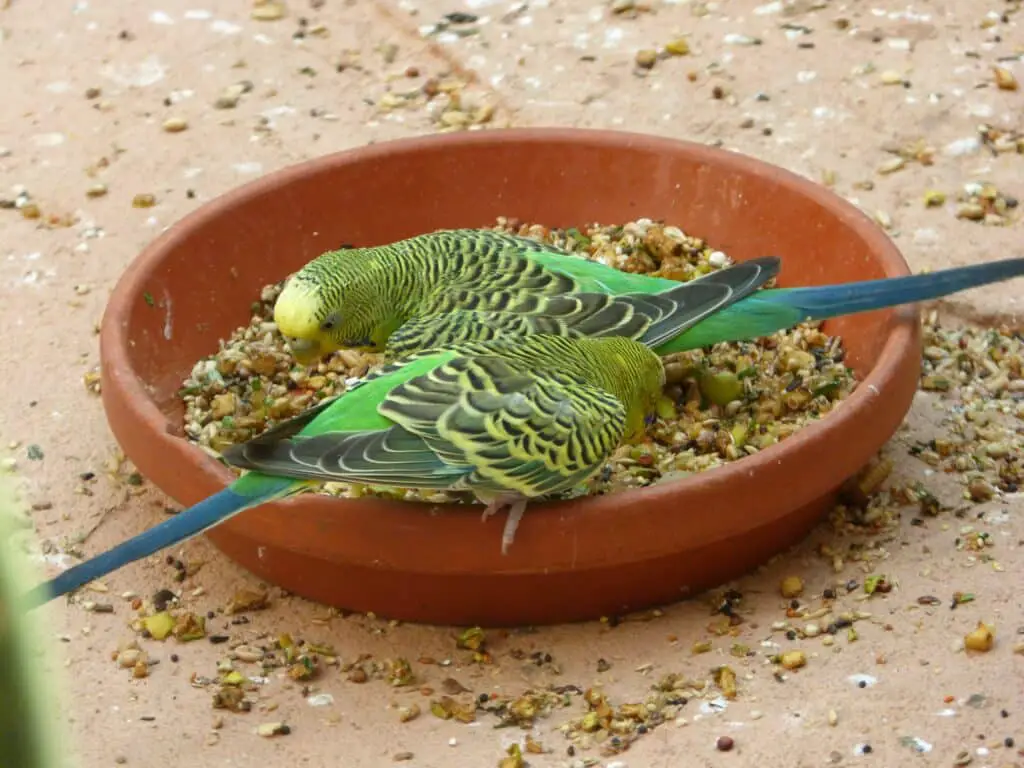
Are bananas OK for parakeets to eat?
Bananas are an excellent source of dietary fiber and potassium, which are important components of a healthy diet for parakeets. Fiber is essential for proper digestion and helps to keep your parakeet’s digestive system functioning properly.
Bananas can indeed be a part of a parakeet’s diet, but there are some important considerations to keep in mind. Parakeets are primarily seed-eating birds, but they can benefit from the occasional addition of fruits and vegetables. Bananas are a good choice in moderation due to their nutrient content.
Bananas are rich in vitamins such as vitamin C and B6, as well as essential minerals like potassium. These nutrients can contribute to your parakeet’s overall health. The natural sugars in bananas provide a quick source of energy.
While bananas offer nutritional benefits, they should be treated as a treat rather than a staple. Their high sugar content can lead to weight gain and potential digestive issues if over consumed. It’s crucial to offer bananas as a small, occasional treat, perhaps once a week, and in small, manageable portions.
Can parakeets eat apples and bananas?
They sure can. Although not all parakeet species naturally eat a lot of fruit, they can be offered most types of fruit in captivity.
Yes, parakeets can eat both apples and bananas, but as with any food introduced to their diet, there are some important considerations to bear in mind. Apples and bananas can provide valuable nutrients to your feathered friend when offered in moderation.
Apples are a good source of dietary fiber, vitamins such as vitamin C and A, and minerals like potassium. To serve apples to your parakeet, make sure to wash them thoroughly to remove any pesticides, then slice them into small, manageable pieces. Remove seeds and the core as they can be harmful.
Bananas are also a suitable choice for parakeets. They contain essential vitamins like vitamin C and B6, as well as potassium. Bananas are relatively easy for parakeets to eat due to their soft texture. You can offer small slices or mash them for easier consumption.
What are parakeets’ favorite food?
Parakeets love broccoli florets, dark leafy greens, finely chopped carrots, sweet potatoes, and other veggies. A seed mix is not going to provide adequate nutrition. You need to be feeding a nutritionally balanced diet. Pellets are an option, but parakeets love whole seeds.
Seeds: Parakeets are primarily seed-eating birds. A high-quality seed mix formulated for parakeets is often a staple in their diet. Millet sprays are a particular favorite among many parakeets.
Fresh Vegetables: Parakeets enjoy a variety of fresh vegetables, including leafy greens like spinach, kale, and lettuce, as well as carrots, broccoli, and bell peppers. These provide essential vitamins and minerals.
Fruits: Many parakeets have a sweet tooth and relish fruits like apples, pears, strawberries, and grapes. Be sure to offer these fruits in moderation due to their natural sugars.
Pellets: Pellet-based diets formulated for parakeets are a convenient way to provide a balanced and complete source of nutrition.
Sprouted Seeds: Parakeets often love sprouted seeds, which are not only nutritious but also provide variety in texture and taste.
Herbs: Fresh herbs like cilantro, parsley, and basil can add flavor and enrichment to their diet.
Cuttlebone and Mineral Blocks: These provide essential calcium for strong beaks and bones and can also be considered a favorite for parakeets.
Can a parakeet eat rice?
Yes, parakeets can eat rice. The assumption that rice swells up a parakeet’s stomach is completely myth. The truth is, rice is completely safe for parakeets and they actually love to eat it.
Cooked and Plain: Parakeets should be given plain, cooked rice without any seasonings, additives, or sauces. Seasonings like salt, spices, or butter are not suitable for their delicate digestive systems.
Moderation: Rice should only be a small part of your parakeet’s diet. It should not replace their primary food sources, such as high-quality seed mixes or pellet-based diets. A teaspoon of cooked rice as an occasional treat is generally sufficient.
Variety: While rice can be a treat, it’s essential to offer your parakeet a well-rounded diet that includes a variety of fresh vegetables, fruits, and other grains in addition to their regular bird food.
Observation: As with any new food, monitor your parakeet’s reaction to rice. Not all parakeets may take to it, and some individuals may have specific preferences.
Hydration: Rice can be dry, so ensure your parakeet has access to fresh water at all times to prevent any potential dehydration.
What is the healthiest parakeet food?
Our top pick for a central parakeet food is ZuPreem’s FruitBlend Flavor Pellets Bird Food. Made entirely from natural grains, FruitBlend pellets are high in nutrients, low in fat, and rich in vitamins, minerals, and amino acids that are missing from most seed-based mixes.
High-Quality Seed Mix: A good seed mix formulated for parakeets should be the foundation of their diet. Look for mixes that include a variety of seeds, such as millet, canary grass seed, and sunflower seeds. Make sure the mix is fresh and free from dust or contaminants.
Pellets: Pelleted diets specifically designed for parakeets are nutritionally balanced and provide essential vitamins and minerals. Pellets can be a convenient way to ensure your bird receives all necessary nutrients.
Fresh Vegetables: Offer a variety of fresh, washed vegetables like spinach, kale, broccoli, carrots, and bell peppers. These provide vitamins, minerals, and dietary fiber.
Fresh Fruits: Occasional servings of fresh fruits like apples, pears, strawberries, and grapes can offer additional vitamins and natural sugars. Limit fruit intake due to the high sugar content.
Sprouted Seeds: Sprouting seeds like millet or sunflower can provide a nutritious and enjoyable treat for parakeets.
Cuttlebone and Mineral Blocks: These are essential for beak health and provide calcium and other minerals.
Clean Water: Fresh, clean water should always be available to your parakeet.
Can budgies eat potatoes?
Other foods you can serve include pasta, rice, toast, eggs, mashed potato, chicken bones and other meats. Fruit may be also offered but many birds will not eat it.
Cooked and Unseasoned: Budgies should only be given plain, cooked potatoes without any added seasonings, butter, salt, or spices. The skin and any green parts of the potato should be removed, as they contain harmful substances.
Moderation: Potatoes should only be an occasional treat in your budgie’s diet. They should not replace their primary food sources, such as high-quality seed mixes, pellets, fresh vegetables, and fruits.
Nutritional Value: Potatoes are not particularly nutritious for budgies compared to other foods like vegetables and fruits. They are primarily starchy and lack the essential vitamins and minerals that budgies require.
Observation: As with any new food, observe your budgie’s reaction. Some birds may enjoy the taste of cooked potatoes, while others may not show interest.
Can parakeets eat raisins?
Indeed, dried grapes or Raisins are safe and very healthy for parakeets. As a matter of fact, you may even find your bird liking raisins more than they like fresh grapes. This is because raisins come in a size and texture that are easier for them to eat and digest.
Moderation: Limit the amount of raisins you offer to your parakeet. Excessive consumption of sugary foods can lead to weight gain and health issues.
Cut into Small Pieces: Chop raisins into small, manageable pieces to prevent choking hazards.
Variety: While raisins can be a delightful treat, they should not replace the core components of your parakeet’s diet, which should include high-quality seed mixes or pellets, fresh vegetables, and clean water.
Observation: Pay attention to how your parakeet responds to raisins. Not all parakeets may enjoy them, so it’s essential to respect your bird’s preferences.
Can parakeets eat tomatoes?
Pieces of ripe tomato should be fine for your parakeet to eat. Do keep in mind that tomatoes are quite acidic, so don’t overfeed them just to avoid the slight chance of stomach irritation or even ulcers.
Yes, parakeets can eat tomatoes in moderation, but it’s essential to offer them as an occasional treat rather than a regular part of their diet. Tomatoes are safe for parakeets when fed in small quantities due to their natural acidity. These colorful fruits provide a variety of nutrients, including vitamins A and C, which can benefit your pet’s health.
You must be cautious when feeding tomatoes to your parakeet. The green parts of the tomato plant, including the leaves and stems, contain a substance called solanine, which can be toxic to birds. Therefore, always ensure that you only offer ripe, red tomatoes, and remove any green parts before serving.
Parakeets have sensitive digestive systems, so it’s vital not to overdo it with tomatoes or any other fruits and vegetables. Introduce new foods gradually to monitor your bird’s reaction and prevent digestive issues. Ideally, tomatoes should be a small part of a well-balanced diet that primarily consists of high-quality parakeet pellets, fresh water, and occasional fruits and vegetables as treats
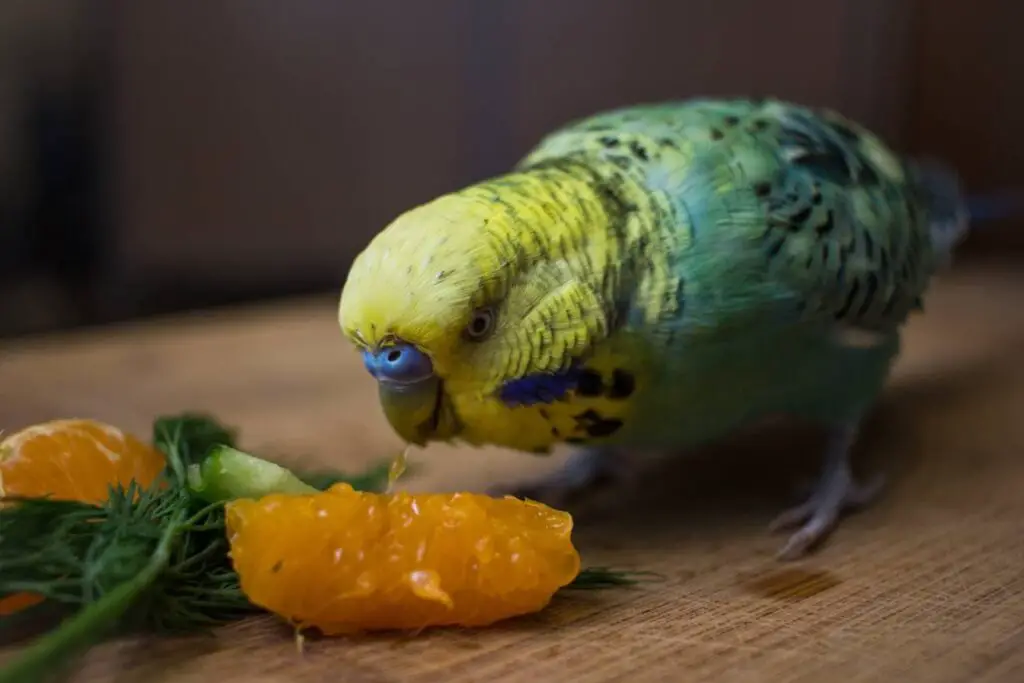
Conclusion
Bananas, when offered in moderation and as part of a well-balanced diet, can be a safe and enjoyable treat for your pet parakeet. These vibrant birds can relish the sweet, creamy texture of bananas as an occasional snack, providing them with a source of vitamins, fiber, and natural sugars. However, it’s crucial to exercise caution and adhere to guidelines when introducing bananas to your parakeet’s diet. Moderation is key, as excessive consumption can lead to weight gain and digestive issues.
Always ensure that the banana is ripe and thoroughly washed to remove any pesticide residues. Consider offering it in small, manageable portions, either as a fresh slice or mashed for easier consumption. As with any dietary changes, it’s advisable to consult with an avian veterinarian or an experienced bird specialist to tailor your parakeet’s diet to its specific needs. By understanding your parakeet’s unique dietary requirements and preferences, you can provide a well-rounded and enjoyable culinary experience for your cherished avian companion.
So, while bananas can indeed be a delightful addition to your parakeet’s menu, remember to approach them with care and in the context of a balanced avian diet. To observe your individual parakeet’s response to bananas. Just like humans, parakeets have their own taste preferences, and not all of them may take to bananas. Some may eagerly devour this tropical fruit, while others might show little interest. It’s essential to respect your bird’s choices and not force them to eat something they don’t enjoy.

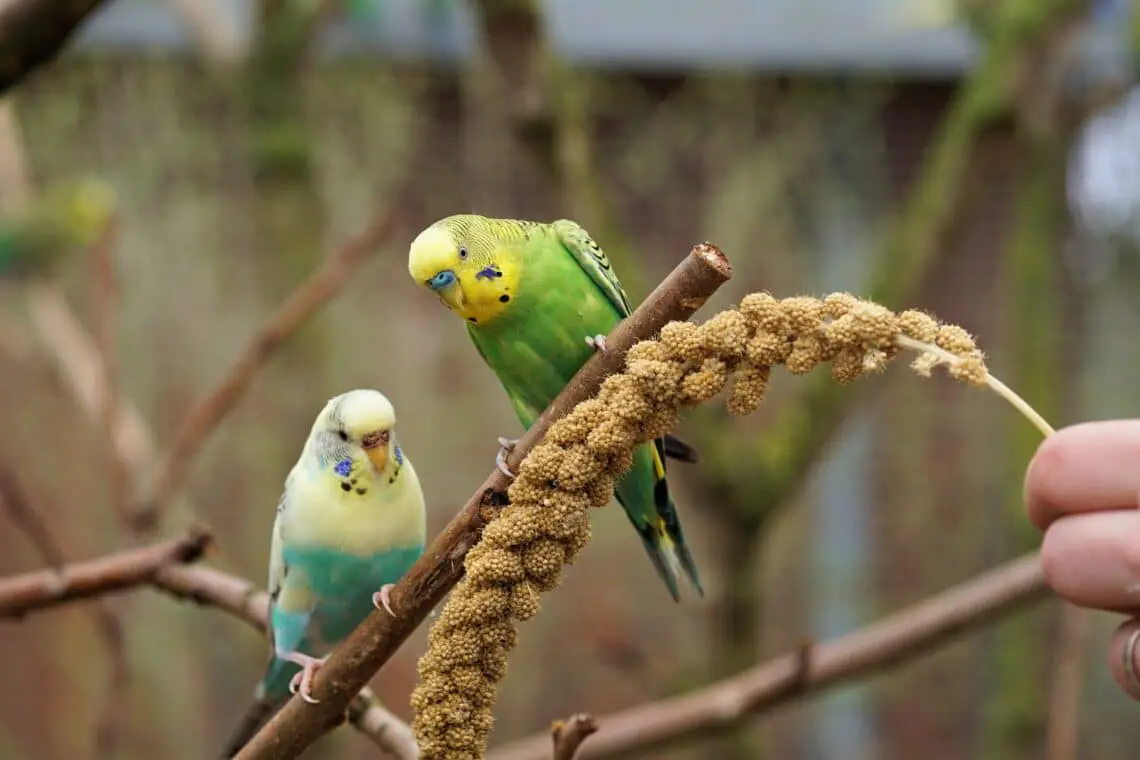
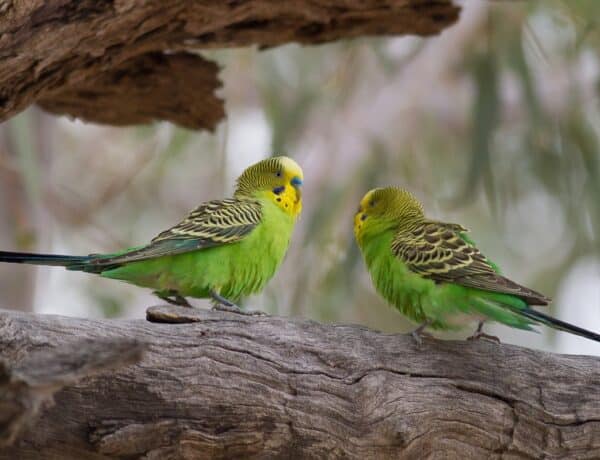
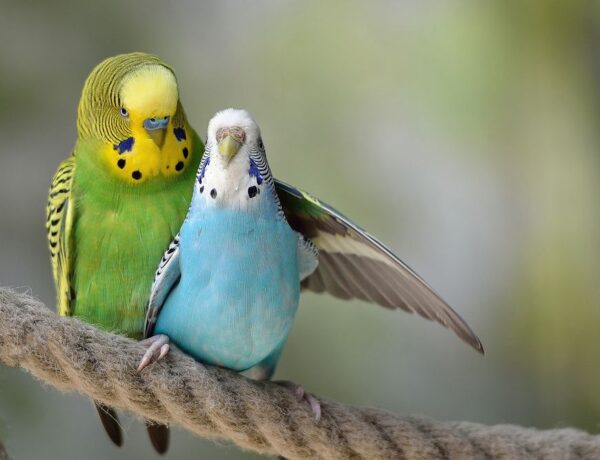
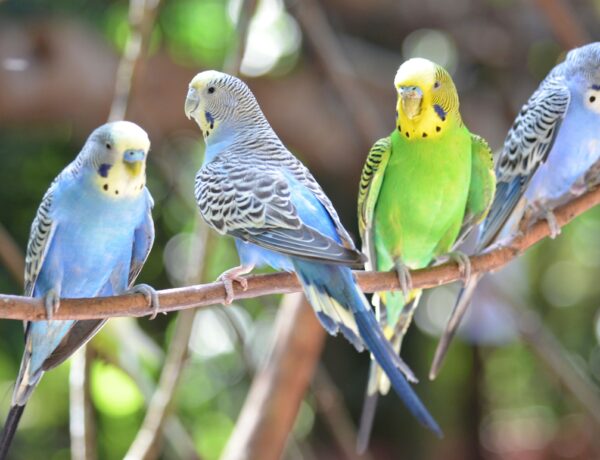
No Comments